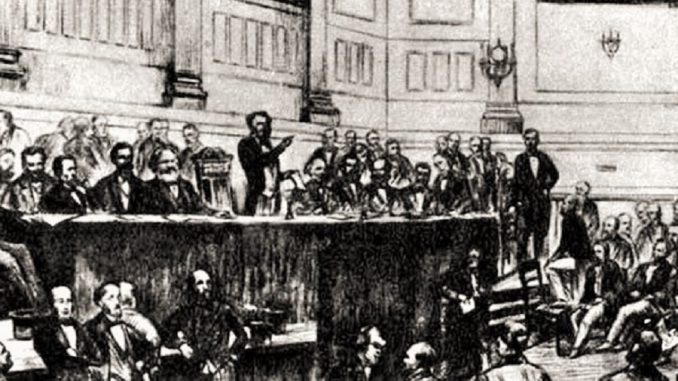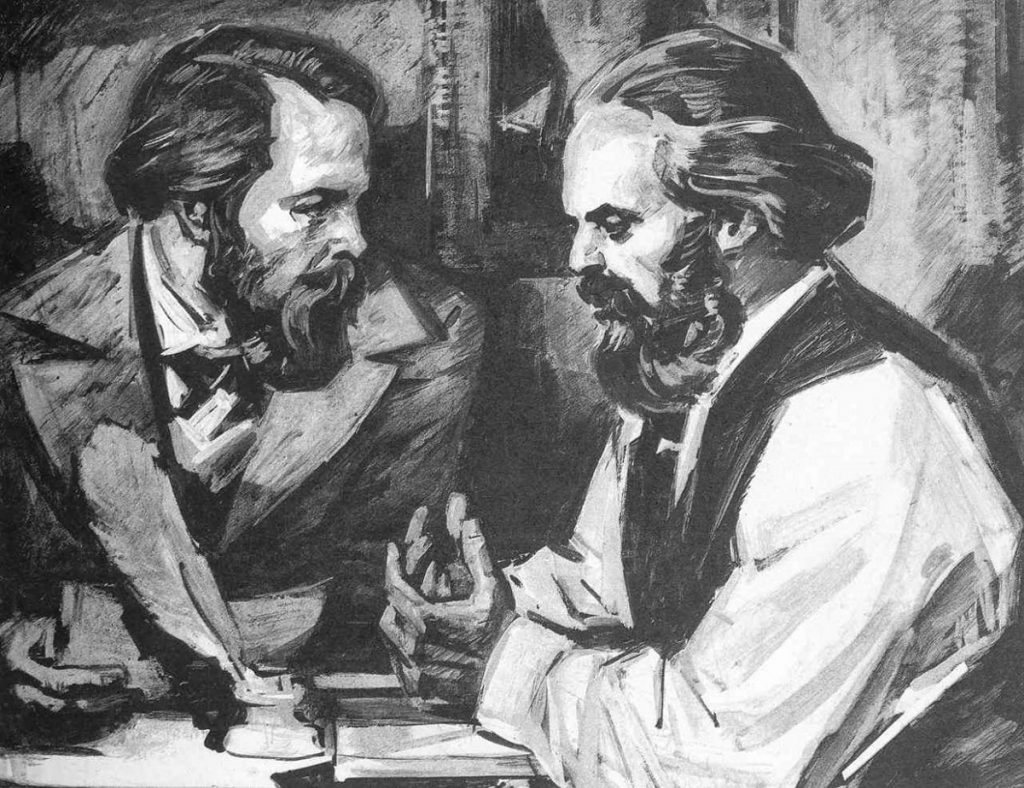
In 1848 Marx and Engels culminated the writing of the Communist Manifesto with a call: «Workers of the world, unite.» Sixteen years later, on September 28, 1864, that call became a reality with the founding of the International Workingmen’s Association (IWA), the First International.
By Emilio Poliak
During the 19th century, capitalism was consolidating in England and spreading throughout Europe. Along with the growth of big industry, the working class increased in number and organization. The struggle for trade union demands was joined by political demands such as the right to vote for workers, promoted by Chartism. But it was during the revolutions of 1848 when the proletariat fought great battles that, although defeated, left important lessons. After a period of retreat, from the great economic crisis of 1857, the labor movement was revived and built new organizations. In England, the country with the greatest capitalist development, a new young trade unionism emerged that would give birth to the Trade Union Congress, the first trade union federation.
Internationalism
Already before 1864 there were attempts at international organization -the Society of Fraternal Democrats, the Communist League and the International Committee-, however, it is in the late 50s when, along with the revival of the struggles, the internationalist sentiment gained influence in the workers’ vanguard. On the one hand, in the face of demands for shorter working hours or wage increases, the British bourgeoisie responded by hiring French, Belgian and German workers, which increased awareness of the need to engage in a common battle beyond national borders. On the other hand, the European proletariat followed attentively and showed solidarity with political processes such as the American Civil War (supporting the North against the slave-owning South) and the Polish insurrection for its independence. It was in this context that, on the occasion of the World Exhibition of 1862, English and French workers strengthened relations and on September 28, 1864, representatives of England, France and other European countries held a joint meeting at Saint Martin’s Hall in London where they decided to launch an international workers’ organization.
The birth of the IWA

There it was resolved to create a General Council to draft the statutes and convene a congress. The Statutes and the Inaugural Manifesto were drafted by Marx and expressed the program and objectives of the new organization. They began by considering that «the emancipation of the working class must be the work of the workers themselves,» defining the importance of class independence against currents that still rode the coattails of the liberal bourgeoisie. The Inaugural Manifesto, in addition to denouncing the capitalist system, raised the need for the proletariat to form its own party independent of the bourgeoisie, as well as the struggle for social revolution and the conquest of political power. It was essentially the content of the Communist Manifesto in a different form.
Internal debates
The First International brought together the main currents of the workers’ movement of the time, since the fundamental objective was to constitute the unity of the workers to confront the bourgeoisie in better conditions. The main currents were the English Trade Unions, which provided the fundamental basis of rank and file; the Proudonhians (followers of Pierre Joseph Proudhon), the Lasalleans (followers of Ferdinand Lasalle) and the Marxists, who came mostly from the old Communist League. Different conceptions of its character and objectives were expressed within it, so ideological debates cut across the life of the IWA. The first polemics were against the Proudonhians. This was one of the sectors with more influence in the first years and its program was based on the promotion of mutualism and cooperativism. It did not propose to destroy the capitalist system but advocated an evolutionary transformation based on the development of workers’ associations. It rejected the trade union movement, the class struggle and the strike as a method of struggle, as well as the political action of the proletariat. There were also ideological battles with the Lasalleans, who were sectarian towards the unions that did not share their program and on the other hand ended up making agreements with Bismark. However, the most important polemic was with Bakunin, who joined the International in 1868. The ideological battle between Marxism and anarchism cut through all the debates of the IWA until its end.
The role of the International
The activity of the International was very important to provide a program for the working class and for its militant action. It was part of the struggle to obtain political rights in England, it promoted the fight for the reduction of the working day and developed campaigns of support and solidarity with strikes in any country where they broke out. It actively intervened in the Paris Commune and contributed to the development of trade union organization and the raising of the political level of workers. And, above all, it left the seed of internationalism sown in the working class.
You may be interested in The third Congress of the Communist International. A school of revolutionary strategy
Dissolution and legacy
After the Paris Commune there was a new ebb in the struggles of the proletariat and a boom in capitalist expansion. In that framework the International weakened, and the working class retreated within its own countries. However, the dissolution in 1874 did not mean the end of the experience and international consciousness; on the contrary, it would set an important precedent that would be taken up years later. Hence Marx’s optimism when he wrote: « Let us give our comrade workers of Europe some time to strengthen their national organizations and soon they will be strong enough to break down the barriers that have been erected between them and the workers in the other parts of the world.» The correctness of those words would be confirmed a few years later. In the latter part of the century, Marxism was gaining influence among the proletariat, which contributed to the formation of important socialist parties that became the basis for the foundation of the Second International in 1889.
Internationalism as a present necessity
Social democracy has transformed since 1914 into part of the bourgeois regime. The Third International founded by Lenin and Trotsky was taken over by Stalinism in the 1920s to be finally dissolved by Stalin in 1943 as part of his post-war agreements with imperialism. And the leaderships that led the post-war revolutions, such as Castroism or Maoism, never pushed for the construction of an international leadership. At present, Trotskyism is the only workers’ current that raises militant internationalism as an imperious necessity of the working class and the exploited peoples of the world. The current systemic crisis, the existence of a world market and strong imperialist institutions such as the IMF, the World Bank, the OECD and others reaffirm the need to build a revolutionary organization of the working class, not only to engage in class solidarity, but to confront the bourgeoisie in all countries and build the General Staff of the world revolution. The MST, together with the International Socialist League, takes up this challenge and contributes our militant strength to this task.








